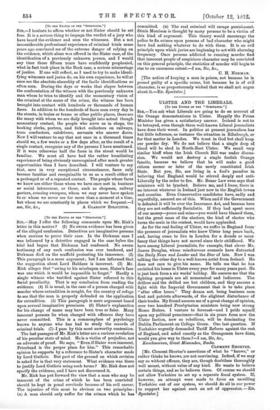[TO THE EDITOR OP THE " SPECTATOR. "] Sin,—May I offer
the following comments upon Mr. Risk's letter in this matter P (1) No sworn evidence has been given of the alleged confession. Detectives are imaginative persons when anxious to prove their case. In the Dickman case I was informed by a detective engaged in the case before the trial had begun that Dickman had confessed. No sworn testimony of any such confession was ever tendered, and Dickman died on the scaffold protesting his innocence. (2) This paragraph is a mere argument; but I am informed that the suggestion about Lord Haldane is incorrect. (3) Mr. Risk alleges that " owing to his misshapen nose, Slater's face was one which it would be impossible to forget." Hardly a single witness who testified against Slater referred to this facial peculiarity. That is my conclusion from reading the evidence. (4) It is usual, in the case of a person charged with murder whose extradition is sought, for the country of refuge to see that the man is properly defended on the application for extradition. (6) This paragraph is mere argument based upon several imaginative premisses. (6) Slater's explanation for his change of name may have been true or false. Many innocent persons lie when charged with offences they have never committed. This is a commonplace of psychology known to anyone who has had to study the records of criminal trials. (7) -I pass by this most unworthy contention.
The last passages of Mr. Risk's letter are a curious revelation of his peculiar state of mind. He is a victim of prejudice, not an advocate of proof. He says, "Even if Slater were innocent, Peterhead is the proper place for him." This remarkable opinion he supports by a reference to Slater's character made by Lord Guthrie. But part of the ground on which revision is asked for is that very statement. What evidence was there to justify Lord Guthrie using such terms P Mr. Risk does not specify the evidence, and I have not discovered it
Mr. Risk has put forward the view that a man who may be innocent of the crime of which be has been convicted should be kept in penal servitude because of his evil career. The injustice of this must be obvious on two principles : (A) A man should only suffer for the crimes which he has
committed. (B) The real criminal will escape punishment. Stinie Morrison is thought by many persons to be a victim of this kind of argument. This theory would encourage the police to fix crimes upon persons of bad character who might have had nothing whatever to do with them. It is an evil principle upon which juries are beginning to act with alarming frequency. Once persons addicted to cunning murder find that innocent people of suspicious character may be convicted on this general principle, the statistics of murder will begin to rise to an enormous extent.—I am, Sir, &c.,
C. H. NORMAN.
[The notion of keeping a man in prison, not because be is proved guilty of a specific crime, but because be is of evil character, is so preposterously wicked that we shall not argue about it.—En. Spectator.]










































 Previous page
Previous page